Tuesday, Oct 10, 2023 | 02:00 PM - 03:30 PM
Location: AA03 Volubilis
OVERVIEW
This 90-minute conference in Marrakesh, Morocco is co-organized by the International Finance Forum (IFF), the Bretton Woods Committee (BWC), and the Center for Global Development (CGD), to be hosted by the IMF.
The Setting—After decades of globalization, the last few years have witnessed a seismic shift in global economic relations. Geo-political tensions, including emanating from the war in Ukraine, have led to the rise of fragmentation. At the same time, global challenges, such as climate change, income inequality, debt burdens, and slow growth, are more wide-spread and deeper than before. In many ways, multilateralism is more at risk than perhaps any time since the inception of the current international system and the Bretton Woods institutions some 80 years ago.
A Path to Pragmatic Multilateralism—Given this challenging context, any sustainable solution requires global cooperation. What can be done to reinvigorate international cooperation and create a path to a more “pragmatic multilateralism” for the new era? This will involve some fresh thinking about the adequacy of the current system, as it is unlikely that the system created in the 20th century will be sufficient to meet the challenges of the 21st century.
In the coming decades, it is expected that the bulk of global economic growth will come from the Global South. Along with the continued increase in their economic weights, emerging markets and developing countries will demand a larger voice and representation in global decision making, including at multilateral institutions. However, the Global South also faces daunting challenges to realize their growth potential, including implementing sound economic policy reforms and ensuring adequate and sustainable financing. Thus, it is in the interest of the global community to ensure that global solutions—with pragmatic multilateralism at its core—support all nations, particularly the Global South. Similarly, building this new kind of consensus would open up the opportunity for a shared emphasis on the pressing global issues confronting us all today.
SPEAKERS
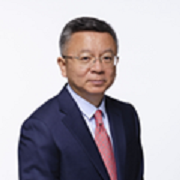
Bo Li
Deputy Managing Director, IMF
Mr. Bo LI assumed the role of Deputy Managing Director at the IMF on August 23, 2021. He is responsible for the IMF’s work on about 90 countries as well as on a wide range of policy issues.
Before joining the IMF, Mr. Li worked for many years at the People’s Bank of China, most recently as Deputy Governor. He earlier headed the Monetary Policy, Monetary Policy II, and Legal and Regulation Departments, where he played an important role in the reform of state-owned banks, the drafting of China’s anti-money-laundering law, the internationalization of the renminbi, and the establishment of China’s macroprudential policy framework.
Outside of the PBoC, Mr. Li served as Vice Mayor of Chongqing—China’s largest municipality, with a population of over 30 million—where he oversaw the city’s financial-sector development, international trade, and foreign direct investment. Mr. Li was also Vice Chairman of the All-China Federation of Returned Overseas Chinese. He started his career at the New York law firm of Davis Polk & Wardwell, where he was a practicing attorney for five years.
Mr. Li holds a Ph.D. from Stanford University and an M.A. from Boston University, both in economics, as well as a J.D., magna cum laude, from Harvard Law School. He received his undergraduate education from Renmin University of China in Beijing.
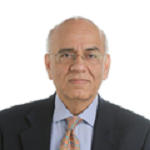
Sir Masood Ahmed
President, CGD
Sir Masood Ahmed is president of the Center for Global Development. He joined the Center in January 2017, capping a 35-year career driving economic development policy initiatives relating to debt, aid effectiveness, trade, and global economic prospects at major international institutions including the IMF, World Bank, and DFID.
Ahmed joined CGD from the IMF, where he served for eight years as director, Middle East and Central Asia Department, earning praise from Managing Director Christine Lagarde as a “visionary leader.” In that role, he oversaw the Fund's operations in 32 countries, and managed relationships with key national and regional policy makers and stakeholders. In previous years, he also served as the IMF's director of External Relations, and deputy director of the Policy Development and Review Department.
From 2003-2006, Ahmed served as director general, Policy and International at the UK government's Department for International Development (DFID). In that role, he was responsible for advising UK ministers on development issues and overseeing the UK's relationship with international development institutions such as the World Bank.
Ahmed also worked at the World Bank from 1979-2000 in various managerial and economist positions, rising to become Vice President, Poverty Reduction and Economic Management. In that role he led the HIPC (heavily indebted poor countries) debt relief initiative, which has to- date brought relief from debt burdens to 36 of the world's poorest nations.
Born and raised in Pakistan, Ahmed moved to London in 1971 to study at the LSE where he obtained a BSc Honors as well as an MSc Econ with distinction.
As a leading expert on international development finance, Masood Ahmed has served on a number of international committees and forums. Currently, he is Policy Advisor to the G20 High Level Independent Expert Group on Strengthening Multilateral Development Banks and co-chair of the World Economic Forum Global Future Council on the Future of Growth. Previously, he was a member of the G20 High Level Independent Panel on Pandemic Prevention, Preparedness and Response and the High Level Advisory Group of on Sustainable and Inclusive Recovery and Growth set up by the World Bank and IMF.
In January 2023, he received a knighthood (KCMG) from the UK government for his services to international development.
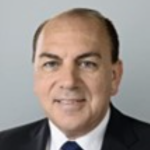
Axel Weber
Former Chairman IFF
Axel Weber is President of the Center for Financial Studies at Goethe University Frankfurt. He is the Chairman of the Trilateral Commission Europe and a member of the Group of Thirty.
From 2012 to 2022, Axel Weber served as the Chairman of the Board of Directors of UBS Group AG. He was also Chairman of the Board of Directors of the Institute of International Finance.
Prof. Weber was the President of the Deutsche Bundesbank (2004-2011) and served as a Member of the Governing Council of the European Central Bank, Member of the Board of Directors of the Bank for International Settlements, German Governor of the International Monetary Fund and was a member of the G7 and G20 Ministers and Governors. He was a member of the steering committees of the European Systemic Risk Board (2011) and the Financial Stability Board (2010-2011).
He was Visiting Professor at the University of Chicago Booth School of Business (2011-2012) and Professor of International Economics at the University of Cologne (2001-2004). He also served as a Member of the German Council of Economic Experts (2002-2004). Before that, he was Professor of Monetary Economics and Director of the Center for Financial Studies at Goethe University in Frankfurt (1998-2001). He was also Professor of Economic Theory at the University of Bonn (1994-1998).
Axel Weber holds a PhD in economics from the University of Siegen. He graduated with a master’s degree in economics at the University of Constance and holds honorary doctorates from the universities of Duisburg-Essen and Constance.
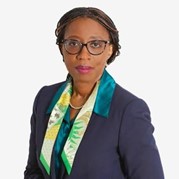
Vera Songwe
Chair and Founder of the Liquidity and Sustainability Facility
Vera Songwe is Chair and Founder of the Liquidity and Sustainability Facility, member of the G20 Finance Ministers Independent expert Group on MB reform, a visiting senior fellow at the Brookings Institution, Co-Chair of the High Level Expert Panel on Climate Finance nominated by the government of the UK and Egypt alongside Lord Nick Stern. She is the former United Nations Under-SecretaryGeneral and the Executive Secretary of the Economic Commission for Africa (ECA).
Songwe has led numerous efforts to bring greater prosperity to Africa. She has worked with African heads of government, Ministers of Finance and Central Bank governors, international organizations and the private sector on macroeconomic stability, monetary policy, financial innovation and inclusion growth, economic integration and trade, and private sector development. She is a leader recognized and respected globally and has contributed policy advice to many continental leaders and institutional leaders globally.
Previously, Songwe was the Regional Director of the International Finance Corporation, covering West and Central Africa. She oversaw a multi-billion dollar portfolio of investments in energy, transportation, manufacturing and technology.
Prior to this, she held a number of roles at the World Bank, including serving as Country Director, Adviser to the Managing Director for Africa, Europe and Central and South Asia. She spent 10 years of her career working and living in Asia. She joined the World Bank as a Young Professional. Prior to joining the Bank, she was a Visiting Researcher at the Federal Reserve Bank of Minnesota and at the University of Southern California. Songwe was named African Icon of the year in 2022 by the African Bankers Association for her work on SDRs, Inflation, debt management and domestic resource mobilization. She was named one of the ‘100 Most Influential Africans’ by Jeune Afrique in 2021 as well the top 50 most influential African Women by Forbes Magazine in 2019 and by the Financial Times as among 25 Africans to watch.
She holds a PhD in Mathematical Economics from the Center for Operations Research and Econometrics, a Master of Arts in Law and Economics and a Diplôme d’études approfondies in Economic Science and Politics from Université Catholique de Louvain in Belgium. She also was presented with an honorary Doctor of Laws degree in December of 2022 and holds a B.A. in Economics and Political science, both from the University of Michigan, Ann Arbor

Sir Dany Alexander
Vice President AIIB
Sir Dany Alexander, as Vice President for Policy and Strategy, drives AIIB’s strategic direction, including its sectoral and country priorities, investment strategy and programming, and operating budget. He oversees AIIB’s environmental and social policies, other operational policies and their implementation. Previously, Alexander served as AIIB’s Vice President and Corporate Secretary when he first joined the Bank in February 2016. Before this, he was Chief Secretary to the Treasury of the United Kingdom and was one of the leaders of UK’s coalition government between 2010 and 2015. He holds a BA in philosophy, politics and economics from the University of Oxford and is an honorary fellow of St Anne’s College, Oxford. He was knighted in 2015. Alexander is from the United Kingdom.
MODERATOR
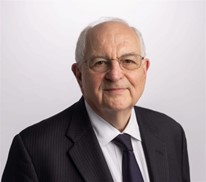
Martin Wolf
Martin Wolf is chief economics commentator at the Financial Times, London. He was awarded the CBE (Commander of the British Empire) in 2000 “for services to financial journalism
PHOTOS